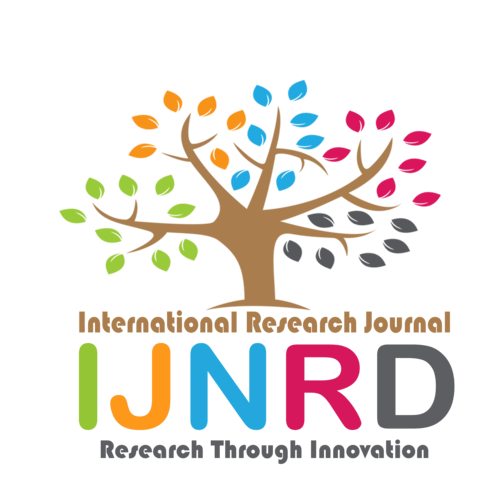|
|||||||||||||||

|
INTERNATIONAL JOURNAL OF NOVEL RESEARCH AND DEVELOPMENT International Peer Reviewed & Refereed Journals, Open Access Journal ISSN Approved Journal No: 2456-4184 | Impact factor: 8.76 | ESTD Year: 2016 Scholarly open access journals, Peer-reviewed, and Refereed Journals, Impact factor 8.76 (Calculate by google scholar and Semantic Scholar | AI-Powered Research Tool) , Multidisciplinary, Monthly, Indexing in all major database & Metadata, Citation Generator, Digital Object Identifier(DOI) |
||||||||||||||
Issue: May 2024
Volume 9 | Issue 5
Review Result and Publication of Paper within : 2-3 days
Click Here For more DetailsFor Authors
Forms / Download
Published Issue Details
Editorial Board
Other IMP Links
Facts & Figure
Impact Factor : 8.76
Issue per Year : 12
Volume Published : 9
Issue Published : 96
Article Submitted :
Article Published :
Total Authors :
Total Reviewer :
Total Countries :
Indexing Partner
Join RMS/Earn 300
Licence
This work is licensed under a Creative Commons Attribution-NonCommercial 4.0 International License







|
Published Paper Details
|
|
| Paper Title: | Forgiveness and trust after betrayal in a Close relationship: among unmarried couples |
| Authors Name: | Suhanee Singh , Dr Anjali Sahai Srivastava |
| Download E-Certificate: | Download |
| Author Reg. ID: |
IJNRD_216291
|
| Published Paper Id: | IJNRD2403458 |
| Published In: | Volume 9 Issue 3, March-2024 |
| DOI: | |
| Abstract: | This research paper aims to provide a comprehensive examination of forgiveness, trust, and the healing process in the aftermath of betrayal. The paper explores the multifaceted nature of forgiveness, emphasizing its role in promoting mental well-being for victims. The distinction between forgiveness and reconciliation is clarified, underscoring the importance of individual empowerment in deciding whether forgiveness is appropriate. Additionally, the paper delves into the benefits of forgiveness, ranging from improved mental health to enhanced relationships and reduced signs of despair. The challenges associated with forgiving someone, particularly in cases of severe offenses such as sexual assault, are acknowledged, emphasizing the importance of self-empowerment in such situations. The paper recognizes the subjective nature of forgiveness and highlights its various dimensions, emphasizing the conscious decision to release resentment and hatred. The benefits of forgiveness are thoroughly discussed, encompassing better relationships, improved mental health, reduced stress, and lower blood pressure. The research also explores why individuals may find it challenging to forgive, attributing it to feelings of rage, misery, and confusion resulting from harm caused by trusted individuals. The innate differences in individuals' forgiveness tendencies are acknowledged, with an emphasis on the potential for personal growth in cultivating forgiveness. The paper outlines practical steps to move towards forgiveness, emphasizing the conscious recognition of the costs and benefits of forgiveness, determining the target of forgiveness, seeking support through groups or counseling, and acknowledging and releasing the emotional impact of the harm. It highlights forgiveness as a transformative process that can lead to feelings of wisdom, empathy, and compassion for those who have caused harm. Further, the paper delves into the significance of trust in various relationships, emphasizing its role as the foundation for social connections and cooperation. Different forms of trust are discussed, from romantic relationships to professional interactions, highlighting its impact on social harmony and individual well-being. The paper explores the reasons trust matters in relationships, emphasizing its role in effective collaboration, shared intimacy, and emotional well-being. The criteria for determining who to trust are discussed, considering factors such as intentions, competence, and the ability to assess and update perceptions over time. The adverse effects of a lack of trust in relationships are outlined, covering aspects such as diminished intimacy, increased negativity, heightened insecurity, and the potential for depression and anxiety. The paper emphasizes the impact of trust on concentration, emotional distress, fear, and loneliness. Practical strategies for improving and repairing trust in relationships are detailed, including open communication, consistent actions, and mutual accountability. The consequences of a lack of trust on mental health are explored, ranging from decreased intimacy to increased distress, fear, and loneliness. Finally, the paper addresses the process of rebuilding trust after betrayal, presenting principles such as full disclosure, no secrets, ongoing communication, accountability, and actions over words. The importance of the 'check-in' mechanism is highlighted, providing a structured approach to maintaining transparency and accountability throughout the healing process. The intricate relationship between forgiveness and healing is explored, emphasizing that forgiveness is often a byproduct of personal recovery, relationship repair, and the restoration of trust. The role of accountability is discussed, stressing the importance of taking full responsibility and demonstrating tangible changes through consistent actions. The paper introduces the forgiveness challenge, emphasizing its significance in the healing process for both partners. Practical tools, such as the forgiveness letter, are proposed to facilitate open communication, express feelings, and outline expectations for the future. The paper concludes by recognizing that the healing process is ongoing, requiring patience, self-compassion, and a commitment to personal and relational growth. |
| Keywords: | Keywords: Forgiveness, Trust, Healing, Betrayal, Reconciliation, Mental Health, Relationships, Accountability, Communication. |
| Cite Article: | " Forgiveness and trust after betrayal in a Close relationship: among unmarried couples", International Journal of Novel Research and Development (www.ijnrd.org), ISSN:2456-4184, Vol.9, Issue 3, page no.e466-e485, March-2024, Available :http://www.ijnrd.org/papers/IJNRD2403458.pdf |
| Downloads: | 00038 |
| ISSN: |
2456-4184 | IMPACT FACTOR: 8.76 Calculated By Google Scholar| ESTD YEAR: 2016 An International Scholarly Open Access Journal, Peer-Reviewed, Refereed Journal Impact Factor 8.76 Calculate by Google Scholar and Semantic Scholar | AI-Powered Research Tool, Multidisciplinary, Monthly, Multilanguage Journal Indexing in All Major Database & Metadata, Citation Generator |
| Publication Details: |
Published Paper ID:IJNRD2403458 Registration ID: 216291 Published In: Volume 9 Issue 3, March-2024 DOI (Digital Object Identifier): Page No: e466-e485 Country: Gautam Buddha Nagar, Uttar Pradesh, India Research Area: Social Science and Humanities Publisher : IJ Publication Published Paper URL : https://www.ijnrd.org/viewpaperforall?paper=IJNRD2403458 Published Paper PDF: https://www.ijnrd.org/papers/IJNRD2403458 |
| Share Article: | |
|
Click Here to Download This Article |
|
| Article Preview | |
|
|
|
Major Indexing from www.ijnrd.org
| Semantic Scholar | Microsaoft Academic | ORCID | Zenodo |
| Google Scholar | ResearcherID Thomson Reuters | Mendeley : reference manager | Academia.edu |
| arXiv.org : cornell university library | Research Gate | CiteSeerX | PUBLON |
| DRJI | SSRN | Scribd | DocStoc |
ISSN Details
 |
 |
ISSN: 2456-4184
Impact Factor: 8.76 and ISSN APPROVED
Journal Starting Year (ESTD) : 2016
DOI (A digital object identifier)
Conference
Open Access License Policy
Important Details
Social Media
| Copyright © 2024 - All Rights Reserved - IJNRD |












Facebook Twitter Instagram LinkedIn